Filter by
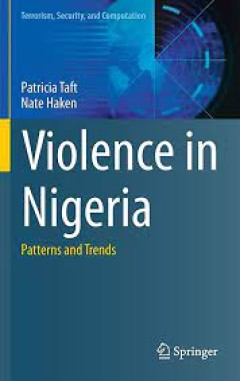
Violence in Nigeria Patterns and Trends
This book takes a quantitative look at ICT-generated event data to highlight current trends and issues in Nigeria at the local, state and national levels. Without emphasizing a specific policy or agenda, it provides context and perspective on the relative spatial-temporal distribution of conflict factors in Nigeria. The analysis of violence at state and local levels reveals a fractal pattern of…
- Edition
- -
- ISBN/ISSN
- 978-3-319-14935-6
- Collation
- XIV, 136
- Series Title
- -
- Call Number
- -
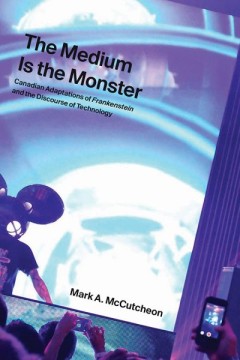
The Medium Is the Monster Canadian Adaptations of Frankenstein and the Disco…
Technology, a word that emerged historically first to denote the study of any art or technique, has come, in modernity, to describe advanced machines, industrial systems, and media. McCutcheon argues that it is Mary Shelley’s 1818 novel Frankenstein that effectively reinvented the meaning of the word for modern English. It was then Marshall McLuhan’s media theory and its adaptations in Cana…
- Edition
- -
- ISBN/ISSN
- 9781771992244.01
- Collation
- -
- Series Title
- -
- Call Number
- 6 x 9, 248 pages

The Law Is (Not) for Kids A Legal Rights Guide for Canadian Children and Teens
In this practical guide to the law for young people of Canada, Ned Lecic and Marvin Zuker provide an all-encompassing manual meant to empower and educate children and youth and those that serve them. The authors address questions about how rights and laws affect the lives of young people at home, at school, at work, and in their relationships as they draw attention to the many ways in which a p…
- Edition
- -
- ISBN/ISSN
- 9781771992374.01
- Collation
- -
- Series Title
- -
- Call Number
- 5 x 8, 304 pages

How to Read Like You Mean It
In this candid and concise volume, Kyle Conway, author of The Art of Communication in a Polarized World, considers how we can open ourselves to others and to ideas that scare us by reading difficult texts. Conway argues that because we resist ideas we don’t understand, we must embrace confusion as a constitutive part of understanding and meaningful exchange, whether between a reader and a tex…
- Edition
- -
- ISBN/ISSN
- 9781771993753
- Collation
- -
- Series Title
- -
- Call Number
- 6 x 9, 184 pages
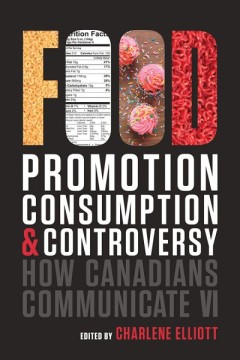
How Canadians Communicate VI Food Promotion, Consumption, and Controversy
By examining topics such as the values embedded in food marketing, the locavore movement, food tourism, dinner parties, food bank donations, the moral panic surrounding obesity, food crises, and fears about food safety, the contributors to this volume paint a rich, and sometimes unsettling portrait of how food is represented, regulated, and consumed in Canada. With chapters from leading scholar…
- Edition
- -
- ISBN/ISSN
- 9781771990257.01
- Collation
- -
- Series Title
- -
- Call Number
- 336 pages
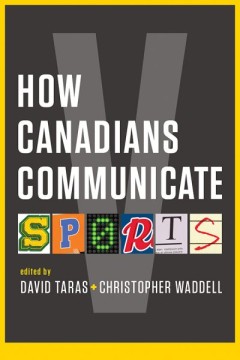
How Canadians Communicate V Sports
Writing from a variety of perspectives, the contributors to this collection set out to explore the impact of the media on our reception of, and attitudes toward, sports—to unpack the meanings that sports have for us as citizens and consumers. Some contributors probe the function of sports as spectacle—the escalation of violence, controversies over drug use, and the media’s coverage of tra…
- Edition
- -
- ISBN/ISSN
- 9781771990073.01
- Collation
- -
- Series Title
- -
- Call Number
- 395 pages
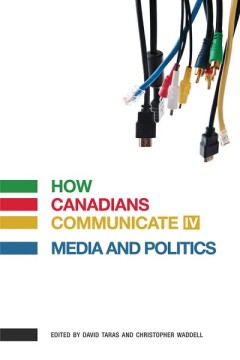
How Canadians Communicate IV Media and Politics
With contributions from such diverse figures as Elly Alboim, Richard Davis, Tom Flanagan, David Marshall, and Roger Epp, How Canadians Communicate IV is the most comprehensive review of political communication in Canada in over three decades – one that poses questions fundamental to the quality of public life.
- Edition
- -
- ISBN/ISSN
- 9781926836812.01
- Collation
- -
- Series Title
- -
- Call Number
- 400 pages
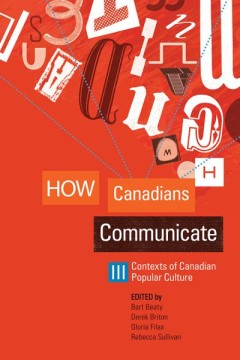
How Canadians Communicate III Contexts of Canadian Popular Culture
Canada does indeed have a popular culture distinct from other nations. How Canadians Communicate III gathers the country’s most inquisitive experts on Canadian popular culture to prove its thesis.
- Edition
- -
- ISBN/ISSN
- 9781897425596.01
- Collation
- -
- Series Title
- -
- Call Number
- 369 pages
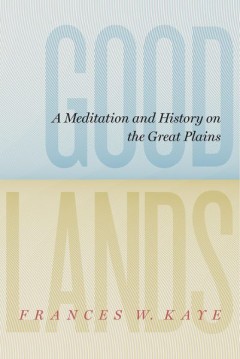
Goodlands A Meditation and History on the Great Plains
Amer-European settlement of the Great Plains transformed bountiful Native soil into pasture and cropland, distorting the prairie ecosystem as it was understood and used by the peoples who originally populated the land. Settlers justified this transformation with the unexamined premise of deficiency, according to which the Great Plains region was inadequate in flora and fauna and the region lack…
- Edition
- -
- ISBN/ISSN
- 9781897425985.01
- Collation
- -
- Series Title
- The West Unbound: Social and Cultural Studies
- Call Number
- 388 pages

Game-Day Gangsters Crime and Deviance in Canadian Football
In Game-Day Gangsters, Fogel argues for a review of the systems by which Canadian football is governed and analyzes the reforms proposed by football leagues and by players. Juxtaposing material from interviews with football players and administrators and from media files and legal cases, he explores the discrepancies between the players’ own experiences and the institutional handling of disci…
- Edition
- -
- ISBN/ISSN
- 9781927356531.01
- Collation
- -
- Series Title
- -
- Call Number
- 176 pages
 Computer Science, Information & General Works
Computer Science, Information & General Works  Philosophy & Psychology
Philosophy & Psychology  Religion
Religion  Social Sciences
Social Sciences  Language
Language  Pure Science
Pure Science  Applied Sciences
Applied Sciences  Art & Recreation
Art & Recreation  Literature
Literature  History & Geography
History & Geography